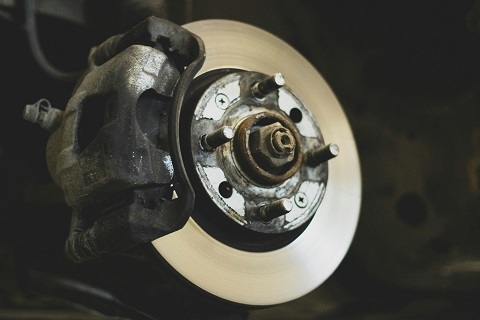Car Brake Guide
Brakes are one of the most critical components of your vehicle, ensuring safety and control on the road. At Mercedes-Benz of Temecula, we understand the importance of maintaining your Mercedes-Benz to the highest standards. This comprehensive brake guide will walk you through the basics of brake systems, common signs of wear, and tips for proper maintenance. Whether you're scheduling service or exploring DIY care, our service department is here to help keep your luxury vehicle performing flawlessly.
Car Brake Pad and Rotor Guide: Understanding Brake Pads
Brake pads are crucial components of a vehicle's braking system, designed to create friction against the rotors to slow or stop the car. There are different types of brake pads, each offering unique benefits. Regular inspection and timely replacement ensure optimal braking system performance, safety, and longevity.
Metallic Brake Pads
Metallic brake pads are made from metals such as iron, steel, and copper, blended with graphite and other fillers. They're highly durable and provide excellent stopping power, especially under high-performance or heavy-duty conditions. Metallic pads are cost-effective and heat resistant, making them ideal for towing or high-speed driving. However, they tend to produce more noise and dust than ceramic pads and can wear down rotors faster due to their abrasive nature.
Ceramic Brake Pads
Ceramic brake pads are composed of dense ceramic material and fine copper fibers. They offer quieter operation and produce less dust, which keeps wheels cleaner. Ceramic pads excel in consistent performance across a wide range of temperatures and conditions, making them a favorite for daily driving. Although more expensive than metallic pads, they're gentler on rotors and have a longer life span, making them a worthwhile investment for many drivers.
What Is a Brake Rotor?
The other important component of your braking system is the brake rotors, also known as brake discs. Brake rotors work alongside the brake pads to convert your vehicle's kinetic energy into heat, which slows or stops the car. When you apply the brake pedal, the calipers squeeze the brake pads against the rotor's surface, creating friction and reducing the wheel's rotation. This friction generates heat, and the rotors are designed to dissipate this heat effectively to prevent overheating and maintain performance.
Brake rotors are typically made from cast iron due to its durability and heat resistance. However, some modern models use advanced materials such as carbon-ceramic composites or steel alloys for enhanced performance. There are also different kinds of rotors, such as drilled or slotted, which impact the cooling efficiency and brake fade. Regardless of which type of rotors you have, it's important to watch for signs of brake rotor issues and schedule regular maintenance to keep them in great shape.
Recognizing Warning Signs
A few common signs suggest it's time to schedule a brake maintenance service. Often, the most noticeable is when you hear a screeching or squealing from your vehicle. This noise occurs when brake pads wear down, and some brake pads are even designed to screech at a certain level of wear so you can replace the pads before the brakes become unsafe.
You should also be on the lookout for reduced brake performance. If it takes your vehicle longer to stop than usual, this is often a sign to pay attention to your brakes. Similarly, if your brake pad feels squishy or sinks lower than normal, it's time for brake maintenance. This issue could result from a leaky brake line, but your brake pads or rotors could also be the problem.
Finally, see if your car veers to one side when applying the brakes. If so, it could mean that your brake pads have worn down unevenly or that you have a stuck caliper. Try driving slowly in a straight line, then applying the brakes. Keep a light touch on the steering wheel to see if you pull to one side or the other.
Car Brake Maintenance Tips
To keep your vehicle safe and performing well, brake maintenance is essential. The best thing you can do is schedule regular service visits, roughly every 12,000 miles or once per year. You can check your owner's manual for specific recommendations on when to schedule your routine maintenance visits.
In between visits, you can help keep your braking system in good condition. Regularly check your brake fluid levels under the hood of your vehicle. You may also be able to see your car's brake pads behind your tires. If so, keep an eye on the thickness level to ensure it's adequate. While there, you may also be able to inspect your brake rotors, where you can look for signs of rust or bent rotors. Consider removing your vehicle's tire for a closer look at these parts.
The Importance of Quality Parts
Using high-quality brake parts is crucial for safety and performance. Premium brake pads, rotors, and fluid last longer, perform better under heat, and provide consistent stopping power. Inferior parts can lead to uneven wear, noise, and reduced braking efficiency, potentially compromising safety. High-quality materials also withstand extreme conditions, reducing the risk of failure during emergencies or heavy use. While they may cost more upfront, investing in reputable brands ensures reliability and can save money by avoiding frequent replacements and costly repairs.
Schedule Brake Maintenance Services in Temecula, California
At Mercedes-Benz of Temecula, we prioritize the safety and performance of your vehicle. Regular brake maintenance is essential to ensure your Mercedes-Benz operates at its best. Our factory-trained technicians specialize in inspecting, repairing, and replacing brake components with genuine original equipment manufacturer parts designed specifically for your model. Whether you need brake pad maintenance, brake rotor replacement, or something else, we're here to help. Schedule your next service visit online today or contact us with any questions. Also, be sure to check out our latest service specials for ways to save on your next visit.
Image by Benjamin Brunner | Licensed with Unsplash License
